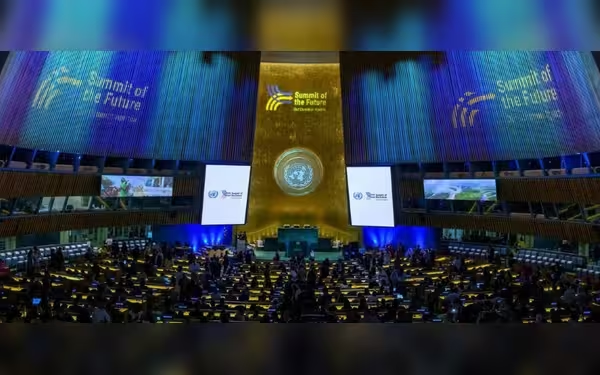Saturday, November 16, 2024 07:49 PM
UNGA Adopts Pact for the Future to Strengthen Multilateralism
- UNGA adopts landmark Pact for the Future.
- Pact emphasizes innovation and youth engagement.
- Agreement aims to tackle climate change and inequalities.
 Image Credits: tribune.com.pk
Image Credits: tribune.com.pkUNGA adopts the Pact for the Future, enhancing multilateralism to address global challenges like climate change and economic inequalities.
The United Nations General Assembly (UNGA) has taken a significant step towards enhancing global cooperation by adopting a "Pact for the Future". This landmark agreement, approved on Sunday, aims to strengthen multilateralism, which is the practice of multiple countries working together to address common challenges. In a world that is increasingly interconnected, the need for effective collaboration among nations has never been more critical.
UN Secretary-General Antonio Guterres hailed the pact as a "step-change towards more effective, inclusive, networked multilateralism." This statement underscores the importance of not just having agreements, but ensuring that they are inclusive and adaptable to the needs of all nations, especially those that are often marginalized in global discussions.
The "Pact for the Future" is designed to address various pressing issues, including climate change, global health crises, and economic inequalities. By fostering a more inclusive approach, the UNGA aims to ensure that all voices are heard, particularly those from developing countries that may lack the resources to participate fully in international dialogues.
One of the key features of this pact is its emphasis on innovation and technology. In today’s digital age, leveraging technology can significantly enhance communication and collaboration among nations. The agreement encourages countries to share knowledge and resources, which can lead to more effective solutions to global problems.
Moreover, the pact recognizes the importance of youth engagement in shaping the future. Young people are not only the leaders of tomorrow but also the innovators of today. By involving them in discussions and decision-making processes, the UNGA hopes to harness their creativity and fresh perspectives to tackle the challenges facing the world.
The adoption of the "Pact for the Future" marks a pivotal moment in international relations. It reflects a collective commitment to work together in a more inclusive and effective manner. As nations face unprecedented challenges, this agreement serves as a reminder that collaboration is essential for a sustainable and prosperous future. The success of this pact will depend on the willingness of countries to engage with one another and prioritize the common good over individual interests. Only time will tell how this landmark agreement will shape the future of global governance, but it certainly sets a hopeful tone for international cooperation.













